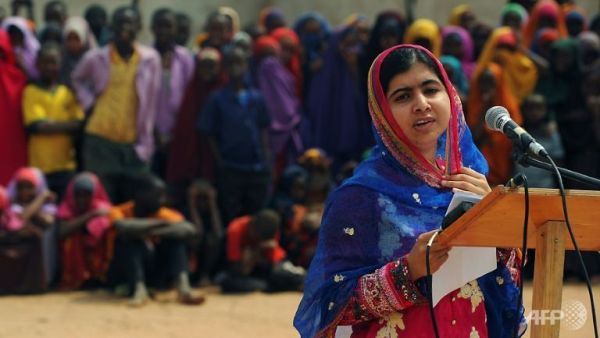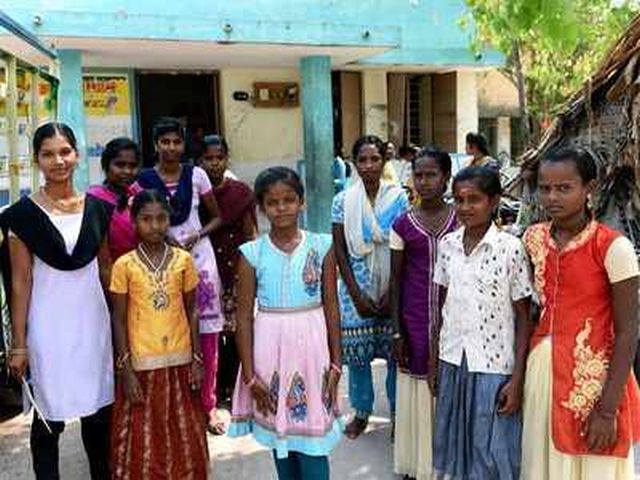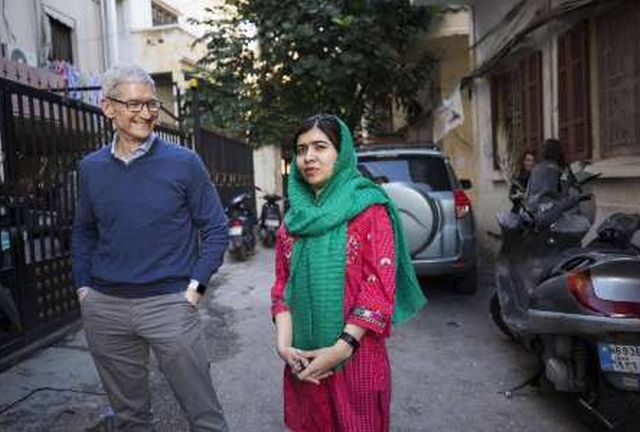
by admin | May 25, 2021 | Entrepreneurship, Muslim World, Women Entrepreneur

Malala Yousafzai
By Hardev Sanotra,
Las Vegas : Taliban’s efforts to keep girls away from education in Pakistan was defeated by their very action of shooting her, says Malala Yousafzai, the world’s youngest Nobel laureate.
“The result is that today millions of people all over the world are speaking out” and taking action against keeping young girls away from the liberating influence of education, she told an audience of several thousand techies here on Tuesday.
She was invited by VMware for their VMworld 2018 conference to talk about her rising from the near-death experience to become a leading voice in the world on educating young girls.
Malala was shot in the head by a Taliban member in 2012 when she defied the diktat of the Sunni Islamic fundamentalist movement, which was entrenched in Afghanistan.
She was interviewed on the stage by Sanjay Poonen, Chief Operating Officer of VMware.
Born in Swat Valley of Pakistan, Malala said her life was as normal as could be and she was lucky to have a father who believed in her and in educating girls.
“We could not then believe that something like the Taliban could happen, as you cannot today, here, that someone would come with guns and take away your right to education.”
She was repeatedly greeted with applause from an appreciative audience as she told her story of defiance.
She said she had to fight against the mindset of people — manifested by the Taliban men — who were against educating girls, or even allowing them to move out of their homes alone.
“They were against education because they knew that it would empower women to be independent.”
Men with guns first banned music, then they stopped women from going out and finally prevented the girls from being educated.
Malala did not remember the incident leading up to her shooting in the Swat Valley as she recalled the moment when she woke up in a hospital in Birmingham, UK, where she stayed for two and a half months.
She was conferred the Nobel Prize for her courage and became an activist and a symbol of defiance against the Taliban’s brand of politics.
Poonen sought to know why she had forgiven the person who sought to kill her. She said he was a young Taliban follower who was told that he had to kill a “blasphemous” person. He thought he was a doing good in a twisted thinking about Islam — a religion, she said, which spreads the message of kindness, tolerance and peace.
She said she hoped that the person gets education and realises the true meaning of the religion he was following. She also did not want to hold on to the anger. “Hate and anger is a waste of energy and I did not want to waste my energy”, and so she moved on to “forgive” the person who had attacked her.
She told the audience that she was named after Malalai of Maiwand who had defied the British troops in the 1880 Battle of Maiwand in Afghanistan, who was one of the few women known in history from the area, because traditionally women “did not have names”, as they were confined behind burkhas or head-to-toe-covering.
“They were called either someone’s daughter or sister,” not having a name of her own.
Talking on a lighter note at the conference, she said she was overwhelmed by “too many acronyms” used by the techies, bringing the house down. She spoke about her love of cricket and how she tried to explain to Westerners that it “was okay” to play a game for five days which was exciting and not boring as many thought.
She spoke about the need for India and Pakistan to have good relations, “but when it comes to cricket we are rivals”. She said it did not matter who got the cricketing World Cup as long as Pakistan won against India.
Poonen, of Indian origin, and who is responsible for worldwide sales, services, alliances, marketing and communication at VMware said that the two nations were united in their love for the game.
Malala also spoke about doing everything to ensure that girls get educated since 150 million of them worldwide did not get the “liberating influence” which would give them freedom and independence.
She works to raise money for her foundation which works in several countries towards that goal.
She told the 100 students invited to the conference from two schools that they should “believe in themselves” and speak up about things they believe in.
“There is no such thing as young age for taking up causes,” she told a student who posed a question on behalf of the others, pointing to her own age of 10 or 11 when she took up the fight against the Taliban.
Poonen announced Dell Technologies’ – VMware’s parent company – plan to provide the invited students’ school with computers, and he urged his colleagues (some 23,000 of them) to donate to Malala’s foundation for which the company would provide matching funds.
(Hardev Sanotra is in Las Vegas at the invitation of VMware for its VMworld 2018 conference. He can be reached at hardev.sanotra@ians.in)
—IANS

by admin | May 25, 2021 | Opinions
 By Seema Rajput,
By Seema Rajput,
Almost half of India’s 1.25 billion people are aged under 25, making it the youngest nation in the world. This can be India’s biggest asset if the energies of the youth are channelised in the right direction.
This is reflected in India’s policy commitment. The government has made efforts to ensure that its youth are healthy, educated and skilled through a number of innovative schemes. Particular efforts are made to ensure education is available to marginalised communities and girls.
However, inequitable gender norms, early/forced marriage, engagement in sibling care, poor delivery of education, and lack of a safe and secure environment in schools, community and at home prevent girls from fulfilling their full potential. Girls’ voices are unheard, they have very low aspirations and don’t have the courage to take decisions for themselves and pursue life opportunities.
As per a UNICEF report, in India, one in three (34 per cent) adolescent girls (aged 15-19) who are married or in union have experienced physical, sexual or emotional violence by their husband or partner. Among these, more than one in 10 (13 per cent) have experienced sexual violence by their partner. A recent study conducted in six Indian states by Save the Children, reveals that due to lack of safe spaces like school, work place and markets, many bright girls are forced to drop out of school. They do not pursue higher education and restrict themselves from engaging in decent work due to fear, and force themselves to remain inside their homes.
The solution to many of these problems lies in empowering the girls and working with communities and the public education system to make it more welcoming. In India, we have worked to create collectives of girls, bringing together 20-25 adolescents in selected villages, to provide them with a safe space to empower them by building their leadership skills. This helps them to acquire skills, knowledge, experience and confidence, and of course have fun by expressing themselves. This safe space provides them with opportunities to break the silence, reflect, think logically, critically review issues, challenge deep-rooted gender and patriarchal norms, and emerge as effective agents of change.
This process of Participatory Action Research is an innovative, yet simple way, to train collectives to identify their safety and security issues, recognise the proliferation of such threats, understand provisions (legal and cultural) to deal with such acts, and come up with concrete plans to improve the conditions of safety and security in their geographies by engaging with powerholders. Through this process, girls in India and Nepal have addressed difficult issues like eve teasing, early and forced marriage, brought dropped-out girls back to school, and improved sanitation and hygiene in schools.
They have used legal avenues, including accessing the women’s helpline when they were abused by boys in the community, as well as in cases of their friends getting married. The cross-border discussion amongst the girls of the collectives has made them aware of the powerful actions taken on the identified issues. By doing so, they are creating a safe space for themselves and for others.
This intervention is not unique. Many organisations across the country work with adolescent girls, build their capacities and enable them to fight for their rights. More efforts are, however, needed to tap into the enthusiasm and optimism of the youth to create a strong network to push for the agenda of safe spaces and safe education. While young people themselves can be at the vanguard of change, their efforts need to be supported through a combination of mass level awareness and sensitisation of teachers, government officials and elected local self-governments to address the different dimensions of safety and security.
It is critical that everyone comes together to ensure that all children, especially marginalised adolescent girls, have safe access to education to become confident and motivated individuals.
(Seema Rajput is Technical Specialist – Education, CARE India. The views expressed are those of CARE India)
—IANS

by admin | May 25, 2021 | Entrepreneurship, Social Entrepreneur, Women Entrepreneur, World
 Rio de Janeiro : Apple Developer Academies will play an important role in supporting the Malala Fund’s mission to provide education opportunities to girls across the globe, Nobel peace laureate Malala Yousafzai has said, referring to deepening of partnerships between the tech giant and the fund.
Rio de Janeiro : Apple Developer Academies will play an important role in supporting the Malala Fund’s mission to provide education opportunities to girls across the globe, Nobel peace laureate Malala Yousafzai has said, referring to deepening of partnerships between the tech giant and the fund.
Meeting the young developers at the Apple Developer Academy here on Friday, Malala said the fund will gain access to new tools to support its mission of free, safe, quality education by tapping into Apple’s network of student developers.
“The students in Apple’s Developer Academy programme share my passion for improving the world around us, and I am eager to see their innovative ideas to help girls in Brazil and across the globe,” Malala said.
The Nobel peace laureate was speaking on the occasion of Apple launching on Friday a new collaboration between its 10 Apple Developer Academies in Brazil and Malala Fund to advance girls’ education opportunities.
“My hope is that every girl, from Rio to Riyadh, can be free to choose her own future,” she said.
In January this year, Apple entered into a partnership with the Malala Fund to support new programmes in India and Latin America, with the initial goal of extending secondary education opportunities to more than 100,000 girls.
“We share Malala’s goal of getting more girls into quality education and are thrilled to be deepening our partnership with Malala Fund by mobilising thousands of Apple Developer Academy students and alumni across Brazil,” Apple’s CEO Tim Cook said in a statement.
“Apple has been committed to education since day one, and we can’t wait to see what our creative student developers come up with to help Malala Fund make a difference for girls around the world,” Cook added.
—IANS

by admin | May 25, 2021 | World

Malala Yousafzai
Brasilia : Nobel Peace Prize laureate Malala Yousafzai said here that voting is the most powerful weapon for change and improve the country and suggested that girls’ education should be a priority for every presidential candidate in Brazil’s forthcoming elections.
In a debate on education and the empowerment of women held in Sao Paulo, the young winner of the 2014 Nobel Peace Prize on Monday stressed that voting is power and it is now in the hands of every Brazilian, so they should use this power to choose the one that will best represent them, reports Efe news.
In front of Brazilian activists and educators, Yousafzai, 20, said that girls’ education in the long term is the most worthwhile investment and should be the top priority in the campaigns of those who vie for the presidency of Brazil in the elections in October.
“Education is more than just about learning and reading. It was about emancipation. It was about empowerment of women,” Yousafzai told some 800 members of the audience in the Ibirapuera Park Auditorium.
Yousafzai also announced that she will launch her personal project very soon in Brazil to promote girls’ education, although she did not offer details about the initiative.
According to the activist, it is estimated that some 1.5 million women in the South American country have been denied this basic right.
Yousafzai, one of the most well-known and influential figures for her fight for women’s rights, was shot by the Taliban at age 15 for her campaign for and defence of girls’ right to go to school.
—IANS



